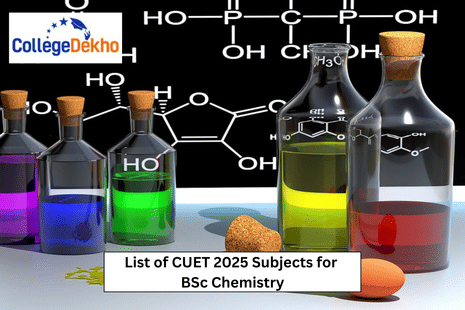
List of CUET 2025 Subjects for BSc Chemistry:
CUET UG 2025 is a requirement for getting admission to a BSc (Hons.) Chemistry program. Students who want to apply for the BSc Chemistry program are required to sit for this exam and choose specific subject combinations prescribed by the official authorities. Students appearing for
CUET UG 2025
for BSc Chemistry need to select the following subject combination: Physics + Chemistry + Mathematics/Applied Mathematics. Admission to BSc Chemistry will be based on CUET scores obtained from these subjects, with students needing at least 30% in any one language from List A of CUET UG 2025. It is also important to check specific university requirements, as some of them may have additional criteria or preferred combinations based on their curriculum.
Latest: CUET UG 2025 Exam is being held from May 13 to June 03, 2025. in CBT mode.
Continue reading to explore CUET subjects for BSc Chemistry, subject combinations, and eligibility criteria for this course!
CUET Subject List of BSc Chemistry
To pursue a BSc in Chemistry through CUET 2025, students must select the appropriate subject combinations. This subject combination is important for eligibility into the BSc (Hons.) Chemistry program at various universities participating in CUET, such as the University of Delhi and others. Given below are the details regarding subject selection for BSc Chemistry:
List A: Languages (Section 1A and Section 1B)
CUET UG 2025 includes a language component divided into two sections: Section 1A and Section 1B. These sections allow students to demonstrate their proficiency in various languages, which is important for admission into numerous central universities across India. Section 1A includes 13 languages, focusing primarily on Indian languages. Students can select one language from this section for CUET UG 2025. Section 1B offers a broader selection of 20 languages, including both foreign and regional languages. This section is specifically designed for students interested in pursuing undergraduate degrees that may require proficiency in these languages. The exam format for both sections includes 50 questions, out of which students need to attempt 40 questions within a time limit of 45 minutes.
Selecting a language is important for CUET, as applicants are required to possess effective communication skills. BSc Chemistry applicants need to score 30% marks in any language from List A. Languages offered in this section are:
- Arabic
- Assamese
- Bengali
- Bodo
- Chinese
- Dogri
- English
- French
- German
- Sanskrit
- Santhali
- Sindhi
- Spanish
- Tamil
- Telugu
- Tibetan
- Urdu
- Gujarati
- Hindi
- Italian
- Japanese
- Kannada
- Kashmiri
- Konkani
- Maithili
- Malayalam
- Manipuri
- Marathi
- Nepali
- Odia
- Persian
- Punjabi
- Russian
List B: Domain-Specific Subjects (Section II)
CUET UG 2025 offers 27 domain-specific subjects, categorized under Section II of the exam. These subjects are primarily based on the Class 12 curriculum, focusing on core areas relevant to various undergraduate programs. The domain-specific subjects in CUET 2025 are categorized into List B1 and List B2. For taking admission to BSc Chemistry, it is mandatory for students to select the following subject combinations:
- Physics: This subject provides important principles that govern chemical reactions and processes. Concepts such as thermodynamics, kinetics, and quantum mechanics are integral to advanced chemistry studies. Additionally, many experimental techniques in chemistry, such as spectroscopy and chromatography, rely heavily on physical principles.
- Chemistry: As the primary subject of the BSc Chemistry program, a deep understanding of chemistry is important. CUET UG 2025 chemistry syllabus covers various topics including organic chemistry, inorganic chemistry, physical chemistry, and analytical chemistry.
- Mathematics/Applied Mathematics: This subject is important for quantitative analysis in chemistry. Skills in algebra, calculus, and statistics are necessary for understanding chemical equations, reaction rates, and data analysis. Proficiency in mathematics also enhances problem-solving skills, enabling students to tackle complex chemical problems easily.
General Test (Section III)
While the General Test is optional, it may be mandatory for certain programs or universities. This section consists of multiple-choice questions that cover a variety of topics, including
- General Knowledge
- Current Affairs
- General Mental Ability
- Numerical Ability
- Quantitative Reasoning (based on basic mathematics up to Grade 8, including arithmetic, algebra, geometry, mensuration, and statistics)
- Logical and Analytical Reasoning
CUET Syllabus for BSc Chemistry
CUET UG BSc Chemistry syllabus comprises 16 units organized into three primary sections: Physical Chemistry, Organic Chemistry, and Inorganic Chemistry. CUET UG 2025 Chemistry syllabus is structured to ensure that students are well-prepared for the exam. All 16 units not only align with the Class 12 NCERT curriculum but also encourage critical thinking and application-based learning in chemistry. Students are advised to familiarize themselves with this syllabus to enhance their preparation effectively.
The name of units along with the included topics of CUET UG 2025 Syllabus for BSc Chemistry are given below:
Units | Sub-Topics |
|---|---|
Solid State | Classification of solids based on different binding forces, calculation of density of unit cell, Band theory of metals, conductors, semiconductors and insulators and n and p-type semiconductor |
Solutions | Types of solutions, Raoult’s law, elevation of B.P., determination of molecular masses using colligative properties |
Electrochemistry | Redox reactions, Kohlrausch’s Law, electrolysis and laws of electrolysis, Relation between Gibbs energy change and EMF of a cell |
Chemical Kinetics | Rate of a reaction, concept of collision theory, Activation energy,Arrhenius equation |
Surface Chemistry | Adsorption, Tyndall effect, Brownian movement, electrophoresis, coagulation, emulsions |
General Principles and Processes of Isolation of Elements | Principles and methods of extraction |
p-Block Elements | Group 15 elements, Group 16 elements, Group 17 elements, Group 18 elements |
d and f Block Elements | General introduction, electronic configuration, Lanthanoids, Actinoids |
Coordination Compounds | Introduction, ligands, coordination number, Werner’s theory |
Haloalkanes and Haloarenes | Nomenclature, nature of C-bond, physical and chemical properties |
Alcohols, Phenols, and Ethers | Nomenclature, methods of preparation, physical and chemical properties, uses |
Aldehydes, Ketones, and Carboxylic Acids | Nomenclature, methods of preparation, physical and chemical properties, uses |
Organic Compounds Containing Nitrogen | Amines, Cyanides and Isocyanides, Diazonium salts |
Biomolecules | Carbohydrates, Proteins, Hormones, Vitamins, Nucleic Acids |
Polymers | Natural and synthetic, methods of polymerization, copolymerization, important polymers |
Chemistry in Everyday Life | Chemicals in medicines, Chemicals in food, Cleansing agents |
To get the full syllabus, download the CUET 2025 Chemistry syllabus from here !
CUET Exam Pattern for BSc Chemistry
CUET UG exam pattern for Bsc Chemistry consists of a single question paper that includes 50 questions, from which students have to attempt 40 questions within a time limit of 45 minutes. Each correct answer awards 5 marks, while incorrect answers result in a deduction of 1 mark due to negative marking. Each question carries equal weight, contributing to a total of 200 marks for the Chemistry section. CUET UG 2025 exam will be conducted in the third week of May 2025 (tentative) & offered in a hybrid format, allowing candidates to choose between a computer-based test and a pen-and-paper format.
Given below are the highlights of CUET UG 2025 exam pattern for BSc Chemistry:
Exam Conducting Body | National Testing Agency |
|---|---|
Examination Name | Common Universities Entrance Test (CUET UG) |
Medium of Examination | 13 Languages (e.g., English, Hindi) |
Examination Mode | Computer-based Test (CBT) |
Time Allotted for Chemistry Exam | 45 minutes |
Total Number of Questions | 50 questions |
Questions to be Attempted | 50 questions |
Total Marks in Chemistry Section | 250 Marks |
To prepare for the BSc Chemistry CUET 2025 exam, keep a few important tips in mind. Focus on mastering PCM (Physics, Chemistry, and Mathematics) as these are the core domain subjects. Additionally, work on your language proficiency, especially in English or any other selected language, as this will help you during the test and in understanding concepts. Students preparing for CUET UG 2025 should focus on understanding concepts rather than rote memorization. Regular practice with CUET UG previous year question papers and mock tests will enhance your familiarity with the exam pattern and types of questions asked. Additionally, referring to NCERT textbooks for Class 12 can provide a good foundation as CUET UG exam aligns closely with this syllabus. Best of Luck!
Are you feeling lost and unsure about what career path to take after completing 12th standard?
Say goodbye to confusion and hello to a bright future!

FAQs
Students must select Physics, Chemistry, and either Mathematics or Applied Mathematics as their subject combination to be eligible for admission to the BSc (Hons.) Chemistry program.
Yes, students must score at least 30% in any one language from List A of CUET UG 2025, which includes various Indian and foreign languages.
The exam will include a single question paper with 50 questions, from which students need to attempt 40 within a time limit of 45 minutes. Each correct answer awards 5 marks, while incorrect answers result in a deduction of 1 mark.
Yes, for pursuing a BSc Chemistry through CUET, Mathematics is a required part of the subject combination.
Was this article helpful?




















Similar Articles
IIT JAM Mathematics (MA) 2026: Exam Date (February 15), Syllabus, Exam Pattern and More
Top 10 IIT JAM Chemistry Questions Answered by Experts
Passing Marks for IIT JAM 2026
IIT JAM 2026 Admission Form: Last Dates, Registration Process, Documents Required
IIT JAM 2026 Exam Day Guidelines, Important Points, Last Minute Tips
IIT JAM Score Improvement: Targeting Weak Areas and Strengthening Performance